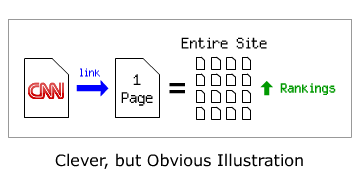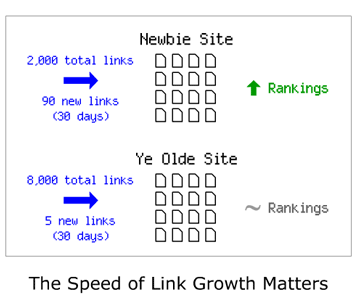
Two Clarifications on How Search Engines Interpret Links
The author's views are entirely their own (excluding the unlikely event of hypnosis) and may not always reflect the views of Moz.
Today I want to touch on two issues that, when improperly perceived, can negatively impact how search marketers and site owners build out their campaigns.
Links to Pages & Domains
Many folks new to search marketing, and even some with experience, incorrectly assume that many elements of the PageRank model are still in place, including the idea that the link weight, anchor text relevance and trust passed from a link influence only the single page targeted by that link. In fact, the reverse is true - a link from a high quality, trusted source can raise the rankings of many pages on a domain because the search engines aren't just counting the link as a vote for the singular page, but as a vote for the entire domain.
This interpretation contributes to what I often call the "Wikipedia Factor" - pages at Wikipedia that have no external inlinks and only one or two links from Wikipedia pages will still rank in the top 5 for competitive queries. This holds true for domains like About.com, Technorati, Expedia, Del.icio.us, and many others - the cumulative link weight and trust that these domains have built influences all the pages they host. It's a big part of the reason why the Texas Hold 'em SERPs are filled with pages hosted on .edu domains, too.

A good example of this factor in effect might be last week's Anatomy of a Super Digg, though it's worthwhile to point out that Jennifer Laycock over at SearchEngineGuide feels strongly that Google and the other engines may remove the value of the inbound links when the topic is unrelated to the site's primary niche. I'm not sure this is accurate - in the offline world, companies constantly conduct promotions and engage in marketing that has little relevance to their products and services, simply to gain branding and mindshare. I think it's more of a philosophical debate than a sure thing as to whether the search engineers think that off-topic viral marketing or media attention unrelated to a website's core content is grounds for a lower weighting.
BTW - This "rising tide lifts all ships" effect is one of the biggest reasons to keep as much content as possible behind one domain, rather than splitting into multiple domains. I've also seen cases where subdomains appear not to receive or pass the full measure of this effect, which is why I always recommend that sites refrain from subdomain use unless there's an especially good argument for them.
Temporal Link Analysis
In many competitive ranking arenas, it is not enough to simply acquire the links necessary to rank well, you also need to continue to attract links to your domain over time, or risk being beaten out by a site that does. Sometimes, when it seems that the search engines aren't always giving the advantage to the site with the most or the best links, temporal link analysis is at play. Google, in particular, is very smart about looking for link growth patterns - that young upstart website that's moving up the ranks may surprise you because it doesn't appear to have the link strength to rank above others, but if you look at the pattern of inbound links, you might see that the newbie is attracting 4-5 new links a day, while the stodgy old timers are only getting that many each month.

A good way to see link growth over time is through a Technorati search (i.e. SEOmoz). Note how Technorati will show not only the number of links coming in, but the timeframe - 2 hours ago, 3 days ago, 4 weeks ago, etc. Since a lot of the fastest link growth happens in the blogosphere and other sites that issue RSS feeds (and thus can be tracked by Technorati), this becomes an invaluable tool. I've always been immensely frustrated that none of the existing web analytics programs offer a feature that allows you to track new inbound links over time (based on URLs that have never sent traffic in the past).
BTW - Next week should be very exciting, as our premium keyword research article launches and a new free article on sources for effective social media marketing (courtesy of Jane) kicks off, too. Plus, Rebecca will be giving her very first public presentation at the Portland Searchfest.




Comments
Please keep your comments TAGFEE by following the community etiquette
Comments are closed. Got a burning question? Head to our Q&A section to start a new conversation.